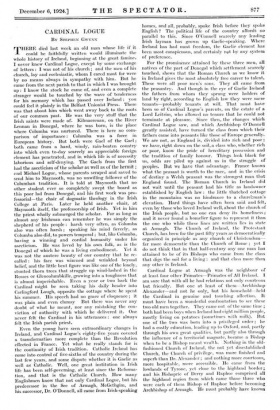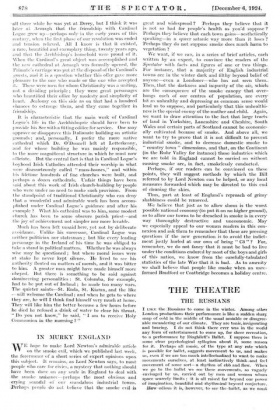CARDINAL LOGUE
BY STEPHEN GWYNN
THERE died last week an old man whose life if it could be faithfully written would illuminate the whole history of Ireland, beginning at the great famine. I never knew Cardinal Logue, except by some exchange of letters : I- was not of his church ; and the men of his church, lay and ecclesiastic, whom I cared most for were by no means always in sympathy with him. But he came from the next parish to that in which I was brought up : I know the stock he came of, and even a complete stranger would be touched by the wave of tenderness for his memory which has passed over Ireland : you could feel it plainly in the Belfast Unionist Press. There was that about him which went away back to the roots of our common past. He was the very stuff that the Irish saints were made of. Kilmacrenan, on the River Lennan in Donegal, where he was born, is the place where Columba was nurtured. There is here no com- parison of importance : Columba was a force in European history. But both were Gael of the Gael ; both came from a hard, windy, rain-beaten country into which even to-day scarcely an appreciable foreign element has penetrated, and in which life is of necessity laborious and self-denying. The Gaels from the first had the asceticism of the scholar as well as of the hermit ; and Michael Logue, whose parents scraped and saved to send him to Maynooth, was no unwilling follower of the Columban tradition. It is told at Maynooth that no other student ever so completely swept the board as this poor lad from Donegal, and his first work was pro- fessorial—the chair of dogmatic theology in the Irish College at .Paris. Later he held another chair, at Maynooth itself, the professorship of Irish. Yet in him the priest wholly submerged the scholar. For as long as almost any Irishman can remember he was simply the shepherd of his people : harsh very often, as Columba also was often harsh ; speaking his mind fiercely, as Columba also did, to powers temporal ; but, like Columba, having a winning and cordial humanity under his asceticism. He was loved by his own folk, as is the Donegal of which he was a living embodiment. Yet it was not the austere beauty of our country that he re- called : his face was wizened and wrinkled beyond belief, and the little bent figure was like one of the lonely, stunted thorn trees that struggle up wind-lashed in the Rosses or Glencolumbkille, growing into a toughness that is almost imperishable. Even a year or two back the Cardinal might be seen taking his daily header into Carlingford Lough, opposite the cottage where he spent his summer. His speech had no grace of eloquence ; it was plain and even clumsy But there was never any doubt of what he meant, nor any mistaking the con- viction of authority with which he delivered it. One never felt the Cardinal in his utterances : one always felt the Irish parish priest.
Even the young have seen extraordinary changes in Ireland, and Cardinal Logue's eighty-five years covered a transformation more complete than the Revolution effected in France. Yet what he really stands for is the continuity of Irish tradition. Catholic Ireland has come into control of five-sixths of the country during the last few years, and some dispute whether it is Gaelic as well as Catholic. Well, one great institution in Irish life has been self-governing, at least since the Reforma- tion, and that is the Catholic Church. How many Englishmen know that not only Cardinal Logue, but his predecessor in the See of Armagh, McGethgim, and his successor, Dr. O'Donnell, all came from Irish-speaking homes, and all, probably, spoke Irish before they spoke English ? The political life of the country affords no parallel to this. Since O'Connell scarcely any leading Irish layman has grown up Gaelic-speaking. Where Ireland has had most freedom, the Gaelic element has been most conspicuous, and certainly not by any system . of preference.
For the prominence attained by these three men, all natives of the part of Donegal which settlement scarcely touched, shows that the Roman Church as we know it in Ireland gives the most absolutely free career to talent These were all poor men's sons. They all came from the peasantry. And though in the eye of Gaelic. Ireland the fathers from whom they sprung were holders of land by right, according to English law they were mere tenants—probably tenants at will. That must have been so of Cardinal Logue's parents, on the estate of a Lord Leitrim, who allowed no tenure that he could not terminate at pleasure. Since then, the changes which Cardinal Logue saw, and which Archbishop O'Donnell greatly assisted, have turned the class from which their fathers came into peasants like those of Europe generally. We are not, as England is, divided into rich and poor ; we have, right down on the soil, a class who, whether rich or poor, know the pride of hereditary possession and the tradition of family honour. Things look black for us, odds are piled up against us in the struggle of peoples. But we have that advantage. France knows what the peasant is worth to the race, and in the crisis of destiny a Welsh peasant was the strongest man that England. found. The Roman Church in Ireland did not wait until the peasant had his title as landowner established by English law : the little thatched cottage in the mountains. was no hindrance to a churchman's elevation. Hard things have often been said and felt, even by those who loved Ireland well, about the church of the Irish people, but no one can deny its homeliness ; and it never found a homelier figure to represent it than the one who while these lines are written lies in state at Armagh. The Church of Ireland, the Protestant Church, has been for the past fifty years as democratically organized in principle as any church of Christendom— far more democratic than the Church of Rome ; yet I do not think that in that half-century any one man has attained to be of its Bishops who came from the class that digs the soil for a living : and that class more than any other is Ireland.
Cardinal Logue at Armagh was the neighbour of at least four other Primates—Primates of All Ireland. I am sure that with all he had relations not only courteous but friendly. But one at least of them--Archbishop Alexander—and not he only, but his household—held the Cardinal in genuine and touching affection. It must have been a wonderful confrontation to see these two old men together. They came out of the same time ; both had been boys when Ireland had eight million people, mostly living on potatoes (sometimes with milk). But one of the two was born into a privileged order ; he had a costly education, leading up to Oxford, and, partly through his own great qualities, but partly also through the influence of a territorial magnate, became a Bishop when to be a Bishop meant wealth. Nothing in the old- fashioned Church of Ireland, the not yet disestablished Church, the Church of privilege, was more finished and superb than Dr. Alexander ; and nothing more courteous, more hospitable, more accessible. He came from the lowlands of Tyrone, yet close to the highland border ; and his Bishopric of Derry and Raphoe comprised all the highland region from which came those three who were each of them Bishop of Raphoe before becoming Archbishop of Armagh. He must probably have known - all -three while he was yet at .Derry, but I think it was later at Armagh that the .friendship with Cardinal Logue grew up—perhaps only in the early years of this century, when the first phase of our revolution was ended and tension relaxed. All I know is that it existed, a rare, beautiful and exemplary thing, twenty years ago, and that the Archbishop's household were proud of it. 1Vhen the Cardinal's great object was accomplished and the new cathedral at Armagh was formally opened, the 'Primate's carriage was put at the disposal of the Cardinal's guests, and it is a question whether this offer gave more pleasure to the one who made or the one who accepted it. These were men for whom Christianity was a uniting, not a dividing principle ; they were great personages who beautified their office by modesty and simplicity of heart. Jealousy on this side as on that had a hundred chances to estrange them, and they came together in friendship.
It is characteristic that the main work of Cardinal Logue's life in the Archbishopric should have been to provide his See with a fitting edifice for service. One may approve or disapprove this Italianate building on artistic grounds ; and, personally, I prefer the more native cathedral which Dr. O'Donnell left at Letterkenny, and for whose building he was mainly responsible, to the more magnificent structure in which he must now officiate. But the central fact is that in Cardinal Logue's boyhood Irish Catholics attended their worship in what were discourteously called " mass-houses," and within his lifetime hundreds of fine churches were built, and perhaps a dozen cathedrals. Unfair things have been said about this work of Irish church-building by people who were under no need-to make such provision. From the standpoint of traditional Christianity who can deny that a wonderful and admirable work has been accom- plished under Cardinal Logue's guidance and after his example ? What his cathedral was to him, some modest church has been to some obscure parish priest—and the joy of achievement not simpler nor more lovable.
Much has been left unsaid here, yet not by deliberate avoidance. Unlike his successor, Cardinal Logue was neither politician nor statesman ; but like every leading personage in the Ireland of his time he was obliged to take a stand in political matters. 'Whether he was always wise may be questioned ; but where moral issues were at stake he never kept silence. -He lived to see his authority flouted on matters of morals, and it was bitter to him. A greater man might have made himself more obeyed. But there is something to be said against domineering .personalities : St. Columba, for example, had to be- put out of Ireland ; he made too many wars. The quieter saints—St. Enda, St. Kiaran, and the like —will welcome the Cardinal ; and when he gets to where they are, he will I think find himself very much at home. They will like him the better because a few hours before he died he refused a drink of water to clear his throat. " Do -you not know," he said, " I am to receive Holy Communion in the morning ? "



















































 Previous page
Previous page